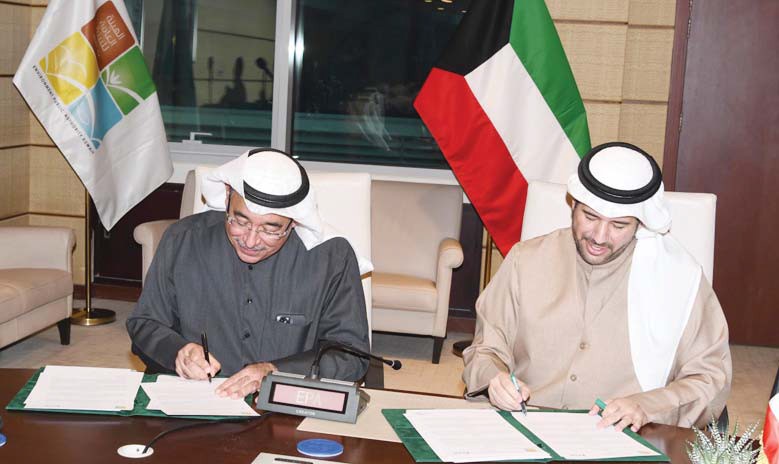14/12/2021
14/12/2021
Clear foci of pollutants through research cooperation
KUWAIT CITY, Dec 14: The Environment Public Authority and the Kuwait Institute for Scientific Research signed a contract to develop an air quality management system to support decision-makers in the country to monitor and control air quality, identify sources of air pollutants, develop the national strategy in this regard, and achieve sustainable development goals. The Chairman and Director-General of the Environment Public Authority, Sheikh Abdullah Ahmad Al- Hamoud Al-Sabah, said in a press statement on Tuesday after the signing, that the authority relies mainly on scientific studies and research to protect the environment and address problems, and the Research Institute is at the top of the institutions with which the authority implements projects in this direction.

Sheikh Abdullah Al-Sabah added that the two sides had previously completed many projects and research studies whose results provided solutions to environmental issues, indicating that this approach also contributes to strengthening the partnership between national institutions and achieving integration between them to serve sustainable development in the country. He explained that the authority has a section specialized in monitoring outdoor air quality, as well as a national network for this purpose and that the authority is constantly seeking to develop monitoring standards and monitoring plans and programmes.
He pointed out that the contract signed with the Institute will also contribute to supporting these efforts and its results will help in achieving the sustainable development goals set by the United Nations that should be reached by 2030. He mentioned that those goals are the third goal on good health and the ninth on well-being, industry, innovation, infrastructure and the eleventh is on sustainable cities and communities, and the thirteenth goal is on climate action. He stressed that through this research and cooperation, there will be clear foci of air pollutants, and then we can play our control role and reduce pollutants in parallel with the increase in the green spot, considering that the institute is the scientific arm of the authority.
Regarding the value of the contract, he stated that it amounts to about 3 million Kuwaiti dinars (about 10 million US dollars), indicating that it will focus on industrial cities and oil areas, as well as maintaining air quality in residential areas. For her part, Deputy Director-General for Environmental Control Affairs at the authority, Samira Al-Kandari, said in a similar statement that this project is one of the important projects for implementing the development plan, which falls into the field of implementing environmental law articles related to maintaining air quality.
Al-Kandari added that the most important feature of the project is that it will be implemented through contracting with international scientific institutions such as Harvard University and international consulting houses, and it will calculate the most important sources of air pollution, determine their location, and improve the air quality measurement system.
For his part, Acting Director General of the Kuwait Institute for Scientific Research, Dr. Mana’ Al-Sedrawi, said in a similar statement that this contract contributes to improving the tool of the national monitoring network run by the authority, identifying pollutants that must be monitored, developing a unified geographical database and studying the impact of air pollution on human health.
Regarding the stages that the project will go through, Al-Sedrawi explained that a research team from the institute will carry out many studies and tasks, including evaluating the level of exposure to air pollutants on human health, developing a unified geographical database on air quality, and producing air pollutant emissions inventory maps. (KUNA)


